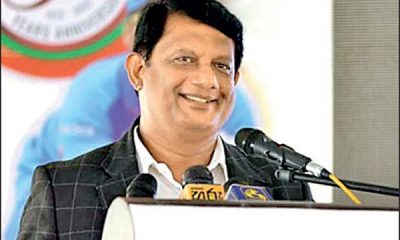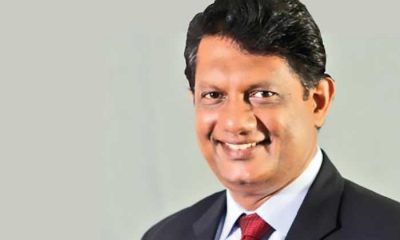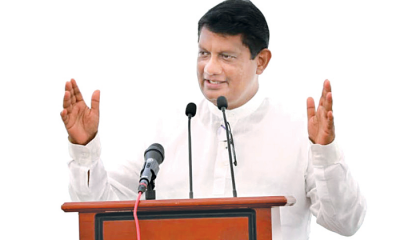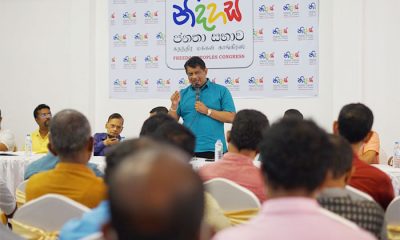News
Dr. Godahewa asks can individuals responsible for unprecedented economic crisis be architects of recovery
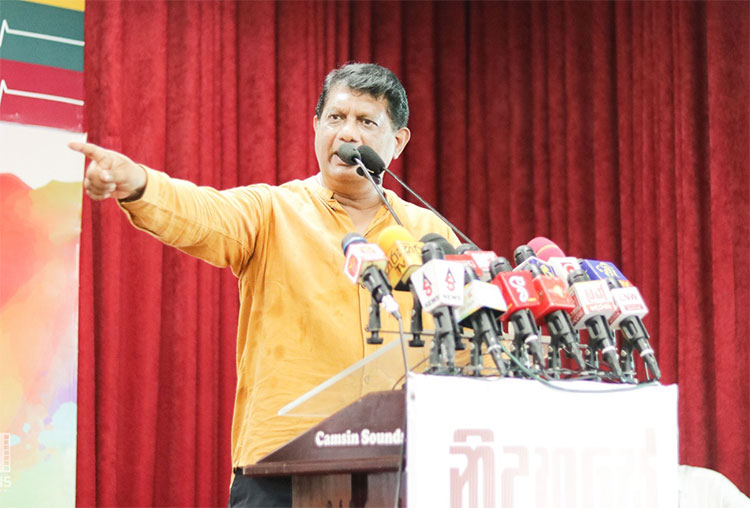
Former State Minister Dr. Nalaka Godahewa, MP, says that the ruling party politicians were labouring under the misconception that the very individuals responsible for the unprecedented economic crisis could be the architects of the economi recovery process.
The Gampaha District MP said that unless that notion was challenged and publicly disapproved it could lead the country down a perilous path and by the time the political leaders realised this grave error, it would be too late for a course correction.
The MP said so addressing a recent seminar organised by the Freedom People’s Congress in Matara.
“It’s no secret that Sri Lanka finds itself in a dire financial situation today. We stand at the precipice of bankruptcy, a situation that has evolved over time due to an unmanageable debt burden that came to a head in early 2022. But in this moment of reflection, I pose a question: How many of us truly understand the root causes of this crisis, and who bears the primary responsibility for leading our nation into this perilous debt trap?
The prevailing sentiment among many is to point the finger at former President Gotabhaya Rajapaksa, asserting that he could have paid off a substantial $6.7 billion debt in 2020 when he held office. Furthermore, it is argued that subsequent administrations were saddled with annual payments exceeding $5 billion, leading to the eventual declaration of bankruptcy.
However, it’s crucial to clarify that these loans were not secured during President Gotabaya Rajapaksa’s tenure. So, the question lingers: who exactly initiated this borrowing spree?
Our nation gained independence in 1948, and as of 2015, a staggering 67 years had passed. During this time, the total debt had mushroomed to a staggering 7,400 billion rupees when converted from local and foreign denominations. It’s important to recognize that many of the significant infrastructure projects we see today, including ports, airports, highways, railways, the Mahaweli project, irrigation systems, power plants, universities, schools, and hospitals, were financed through loans secured over these six decades.
In a surprising twist, the period between 2015 and 2019 witnessed a 75% increase in the country’s total debt, with no commensurate large-scale development projects to show for it. By the time the “good governance” government was replaced in 2019, the debt had soared from 7,400 billion to a staggering 13,000 billion rupees, including foreign debt exceeding $40 billion, with $11.05 billion in short-term commercial debt or sovereign bonds looming ominously.
This debt crisis, ultimately, was inherited by Gotabaya Rajapaksa, and the resulting shortages in oil, gas, and electricity in early 2022 caused public outrage, leading to his removal from office. However, it’s important to note that he was not the architect of this economic quagmire.
We must pause to reflect on who managed our nation’s economy during the years 2015-2019, a period that witnessed a decline in economic growth from 5.5% in 2015 to a mere 2.1% by 2019. During this same time frame, the total debt swelled from $54 billion to $74 billion, all while our national resources failed to see a corresponding increase.
Consider the parallels with the present day. In the past year, our debt has skyrocketed, reaching $96 billion by June 2023. The key difference now is that we are not servicing this debt, sparing us the queues for oil and gas, but it has not been offset by an increase in foreign income.
In 2022, our economy contracted by a staggering 7.8%, and the first quarter of 2023 saw an even more alarming contraction of 11.5%. The government has yet to reveal the full extent of the second-quarter decline, but early indications suggest a crisis of greater magnitude.
So, let us ask ourselves: Is it rational to believe that the individual held responsible for this crisis can simultaneously be its savior? This question may linger, but time may be running out for us to find the answer.
In the days ahead, the true origins of this crisis will become increasingly clear, but by then, it might be too late to reverse the course we are on. It is imperative that we scrutinize our leaders and policies closely, and work collectively to chart a path toward financial stability and prosperity for our beloved Sri Lanka.”
News
US sports envoys to Lanka to champion youth development

The U.S. Embassy in Colombo welcomed the U.S. Sports Envoys to Sri Lanka, former National Basketball Association (NBA) and Women’s National Basketball Association (WNBA) players Stephen Howard and Astou Ndiaye, from June 8 through 14.
The Public Diplomacy section of the U.S. Embassy said that it would launch a weeklong basketball program intended to harness the unifying power of sports, made possible through collaboration with Foundation of Goodness and IImpact Hoop Lab.
While in Sri Lanka, Howard and Ndiaye, both retired professional basketball players, will conduct a weeklong program, Hoops for Hope: Bridging Borders through Basketball. The Sports Envoys will lead basketball clinics and exhibition matches and engage in leadership sessions in Colombo and Southern Province for youth aged 14-18 from Northern, Uva, Eastern and Western Provinces, offering skills and leadership training both on and off the court. The U.S. Envoys will also share their expertise with the Sri Lanka Basketball Federation, national coaches, and players, furthering the development of basketball in the country. Beyond the clinics, they will collaborate with Sri Lankan schoolchildren to take part in a community service project in the Colombo area.
“We are so proud to welcome Stephen and Astou as our Sports Envoys to Sri Lanka, to build on the strong people-to-people connections between the United States and Sri Lanka,” said U.S. Ambassador Julie Chung. “The lessons that will be shared by our Sports Envoys – communication, teamwork, resilience, inclusion, and conflict resolution – are essential for leadership development, community building, equality, and peace. The U.S. Sports Envoy program is a testament to our belief that sports can be a powerful tool in promoting peace and unity.”
News
Rahuman questions sudden cancellation of leave of CEB employees

SJB Colombo District MP Mujibur Rahuman in parliament demanded to know from the government the reasons for CEB suspending the leave of all its employees until further notice from Thursday.
MP Rahuman said that the CEB has got an acting General Manager anew and the latter yesterday morning issued a circular suspending leave of all CEB employees with immediate effect until further notice.
“We demand that Minister Kanchana Wijesekera should explain this to the House. This circular was issued while this debate on the new Electricity Amendment Bill was pending. There are many who oppose this Bill. The Minister must tell parliament the reason for the urge to cancel the leave of CEB employees,” the MP said.However, Speaker Mahinda Yapa Abeywardena prevented Minister Wijesekera responding to the query and said that the matter raised by MP Rahuman was not relevant.
News
CIPM successfully concludes 8th Annual Symposium

The Chartered Institute of Personnel Management (CIPM) successfully concluded the 8th Annual CIPM Symposium, which took place on 31st May 2024. Themed “Nurturing the Human Element—Redefining HRM in a Rapidly Changing World,” the symposium underscored the pivotal role of human resource management (HRM) in today’s dynamic global landscape. Since its inception in 1959, CIPM has been dedicated to advancing the HR profession through education, professional development, and advocacy, solidifying its position as Sri Lanka’s leading professional body for HRM.
Ken Vijayakumar, the President of the CIPM, graced the occasion as the chief guest. The symposium commenced with the welcome address by the Chairperson, Prof. Arosha Adikaram, followed by the Web Launch of the Symposium Proceedings and Abstract Book by the CIPM President. The event featured distinguished addresses, including a speech by Chief Guest Ken Vijayakumar, President of CIPM, and an address by Guest of Honor Shakthi Ranatunga, Chief Operating Officer of MAS Holdings Pvt. Ltd., Sri Lanka.
The symposium also featured an inspiring keynote address by Prof. Mario Fernando, Professor of Management and Director of the Centre for Cross Cultural Management (CCCM) at the University of Wollongong, Australia.
Vote of Thanks of the inauguration session was delivered by Dr. Dillanjani Weeratunga, Symposium Co-chair.
The symposium served as a comprehensive platform for researchers to present their findings across a wide range of critical topics in HRM. These included Cultural Diversity and Inclusion, Talent Development and Retention, Ethical Leadership and Corporate Social Responsibility, Adapting to Technological Advancements, Mental Health and Well-being at Work, Global Workforce Challenges, Employee Empowerment, and Reskilling and Upskilling.
The plenary session was led by Prof. Wasantha Rajapakse. Certificates were awarded to the best paper presenters during the valedictory session, followed by a vote of thanks delivered by Kamani Perera, Manager of Research and Development.
The annual symposium of CIPM was a truly inclusive event, attracting a diverse audience that spanned undergraduates, graduates, working professionals, research scholars and lecturers. This widespread interest highlights the symposium’s significance in the field of HRM, offering a unique opportunity for everyone to network and learn from scholarly brains.The CIPM International Research Symposium was sponsored by Hambantota International Port, Sri Lanka Institute of Information Technology (SLIIT), E B Creasy & Co. PLC, and Print Xcel Company.




